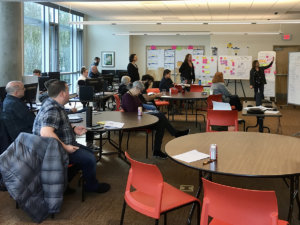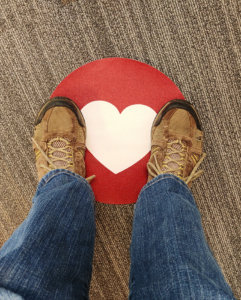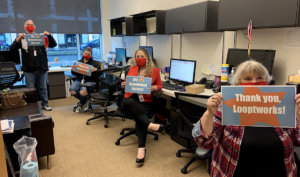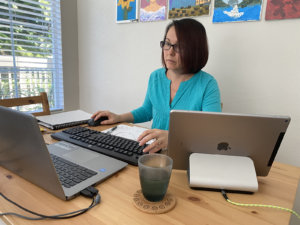This content block does not have a preview.
We’re taking this opportunity to reflect on the past year, a time of both unprecedented hardship and also unflagging compassion at Central City Concern. We first shared this story back in September, six months after the first positive COVID-19 case was reported in Oregon. Our work to keep serving clients during this pandemic continues, and we’re grateful to the staff and supporters who make that possible.
It was a Friday and most Central City Concern employees had already gone home when Oregon announced its first case of COVID-19 on February 28th. But for key CCC leaders, the work had just begun. That weekend started a whirlwind of planning and strategizing to chart a path for continued operations at the start of a global pandemic.

Pictured here in February before the mask mandate, the Incident Management Team congregated at the beginning and end of each day to develop and refine a new plan of operations for staying open amid a global pandemic. “We came to the conclusion that all services were vital,” said CMO Andy Mendenhall.
“The big question on our minds was, will we remain open for business? Can we remain open?” said Crystal Vega, Administrative Director of Human Resources.
“We examined our operations and tried to figure out what things could be shut down. But we came to the conclusion that all services were vital,” said Chief Medical Officer Andy Mendenhall.
Finding new ways for 1,000 employees to safely serve more than 13,000 clients, patients and residents required dramatic action. CCC President and CEO Rachel Solotaroff put all other work on hold and instituted a formal crisis management system. Led by Chief Operating Officer Jacquelyn Hunt, the new Incident Management Team met daily, sometimes even hourly, as they worked to interpret and implement constantly changing guidance from the CDC and Oregon Health Authority. Each change was communicated across the organization to more than 30 programs spanning health, housing, recovery and employment support.
Ensuring safety quickly became a key priority. Pandemic protocols called for mobilizing into new positions, such as symptom screeners at clinic entrances and providers stationed at separate triage clinics for symptomatic patients. CCC’s Community Maintenance Team installed plexiglass shields wherever clients and staff would need to be in close contact. Heart-shaped floor stickers reminded clients to stay 6 feet apart while they waited for appointments. Visitors were barred from residential buildings, and vulnerable residents received donated food boxes so they could shelter in place. The Human Resources team wrote guidelines for employees who became ill or were otherwise impacted by the pandemic, and devised recommendations for paid time off and supplemental pay for many employees.

At CCC, we’re “spreading the love” with friendly floor markers made by the Office of Equity and Inclusion. These physical-distancing reminders are a gentle, more trauma-informed way to help keep folks safe when they must receive in-person care.
Clinicians made the switch to virtual visits by phone or video for primary care, counseling sessions and recovery support— something that hadn’t existed at CCC before the pandemic.
“Three days after we switched to virtual, we went from having zero telehealth visits to 1,000,” said Jack Keegan, Telehealth Manager.
And as Portland shut down, CCC stayed open. Throughout the pandemic, CCC’s clinics and 24/7 recovery support facilities safely kept their doors open to patients whose care could not be shifted to telehealth — including everything from picking up medications to receiving medical care for acute conditions. At each of CCC’s nearly 40 buildings, janitorial teams implemented deep cleanings every shift and increased regular disinfection of high-touch surfaces — from elevator buttons and handrails to table tops and chairs. They donned Tyvek suits to sanitize rooms where COVID patients had been.
For residents needing primary care, CCC made it even easier to access than before. Leslie Tallyn, Director of Quality said, “Before the pandemic, it was common for some our housing clients to receive medical care by accessing the emergency room. But with COVID in our community, our residents didn’t want to go to the hospital and we didn’t want them to go, either.” 175 more residents are now enrolled in CCC’s primary care than were at the same time last year, making it easier to stay healthy and connected— even during a time of widespread worry and isolation.
Housing teams helped facilitate better access to care, too. Dana Brandon, Director of Supportive Housing, said, “We got a cell phone into every CCC building in order for residents to be able to call and get screened and then tested based on the screening results. We tracked residents with positive COVID tests, exposures or concerning symptoms, so that Health Services could facilitate quarantine procedures.”
Early on, managers scoured every building for protective equipment and cleaning supplies. They found 3500 surgical masks in March, but that wouldn’t cut it at a time when over 1,000 masks were being distributed each week at CCC’s clinical sites.

Community members stepped up to donate protective gear, cleaning supplies and more – including over 10,000 fabric face coverings! CCC Recovery Center team members pose in their red masks from local upcycling company Looptworks, who donated masks and DIY mask-making kits for CCC supporters to sew at home. (From Left: Robert Tsow, Counselor and Team Lead; Marissa Donovan, Peer Support Specialist; Jennifer Zimmerman, Administrative Specialist; Jaye Hill, Counselor.)
“Donations saved us. I’m not over embellishing when I say that,” said Purchasing Manager Oscar Solorio. CEO Rachel Solotaroff quickly secured a donation of 10,000 N-95 masks from the Oregon Health Authority. In addition to donations from local health partners, the Portland community stepped up in a huge way. Community members and local businesses donated more than 10,000 cloth face coverings, plus fabric protective gowns and 3-D printed face shields. Today, Solorio and others have amassed enough protective gear and cleaning supplies to ensure continued safety for CCC employees and clients through the coming months.
As an organization built around human connection, shifting to remote and physically distanced practices were major adjustments. Everything had to become virtual, and quickly. The Information Technology team built a virtual workspace for the Incident Management Team— and then expanded that to the rest of CCC’s workforce. By the time Governor Brown’s Stay at Home Order went into effect on March 23rd, the IT team had expanded the capacity of CCC’s servers twenty-fold.

For Maide Almeida, Puentes is like a family. She is working from home during the COVID-19 pandemic, connecting with clients over the phone and in video group sessions. “Our clients need connection,” she said.
Recovery support teams strove to stay connected to clients facing increased adversity. For Puentes and the Imani Center, two culturally specific programs, a big part of that work became virtual too. The Puentes program counteracted their Latinx clients’ growing isolation with the first Spanish-language online group recovery meetings in Portland. The Imani Center, which provides Afro-centric support to Black community members, quickly sourced cell phones for their clients. Another program, Flip the Script, facilitated safe in-person gatherings where participants could process and take action around the anti-racism and police reform work that has increasingly overlapped with the COVID-19 pandemic.
Today, six months have passed since the first positive COVID-19 case in Oregon and CCC is functioning at the same capacity as before. “The best proof that we have been successful throughout this pandemic is the fact that we haven’t had a big outbreak,” said Mercedes Elizalde, Director of Public Policy and a member of the Incident Management Team. “We accomplished that by increasing janitorial services, having people spread out, having enough PPE and communicating infection prevention measures.”
And CCC is doing all that without sacrificing personal connection, thanks to the resilience, dedication and compassion of each employee. For sub-acute technician Cassandra Collins, who has worked at CCC’s Hooper Detoxification and Stabilization Center for 16 years, observing physical distancing requirements has been difficult, but worth the effort. “I’m a hugger, and I can’t do that now,” she said. “But you know, they can tell you’re smiling even behind the mask. Patients can see it in your eyes.”